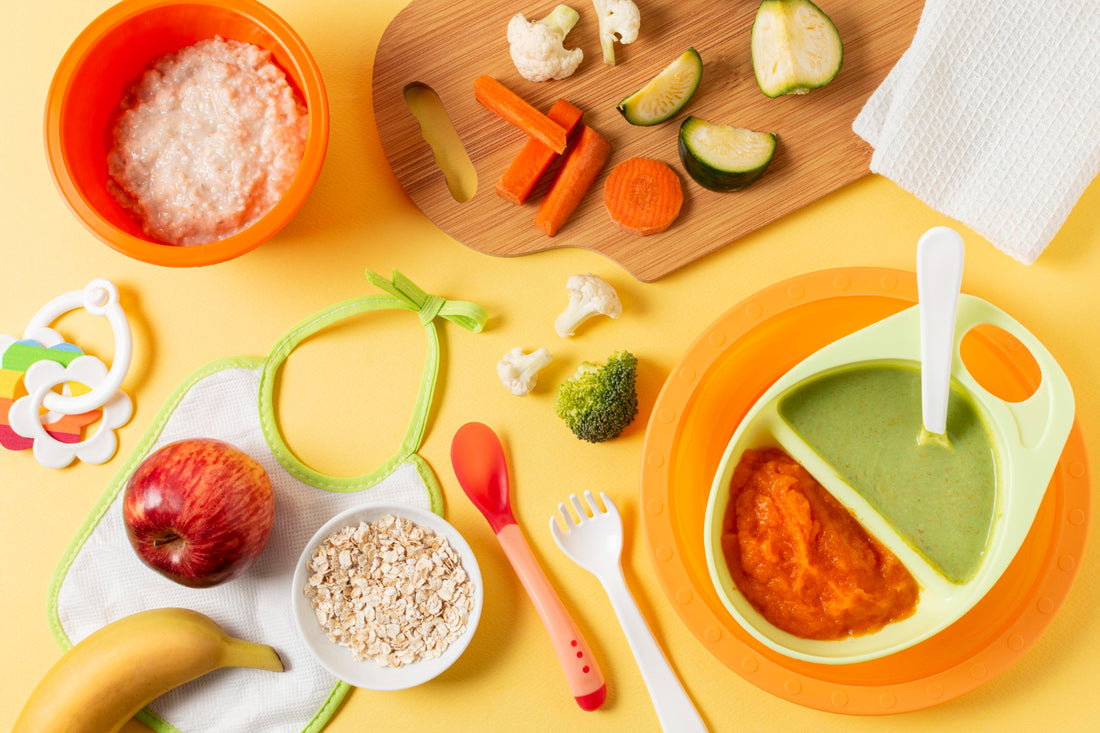Due to their tiny tummies, babies don't eat much, so it's crucial that their diets contain plenty of nutrients. Here is a comprehensive list of age-appropriate superfoods that are accessible, nourishing, and packed with nutrients.
Superfoods: What Are They?
Superfoods are not a new concept, but the term is relatively new. It is a type of food that offers maximum nutrition for a minimum amount of calories. Vitamins, minerals, and antioxidants are also abundant in superfoods.
Superfoods for babies: When can they be consumed?
When prepared according to your infant's eating skills, the items in this superfood list are suitable Best Foods for Babies 6 months and older. Purees of meat, fruit, and vegetables may be gradually introduced earlier than 6 months if your baby is ready. You should not introduce solid foods before the age of four months. Do not introduce certain foods or foods that are best for your baby until you consult your pediatrician.
The First Foods Your Baby Should Eat: How to Introduce Solids
When your baby turns 1 years old, his or her diet gradually becomes more solid. Present a wide variety of foods in an appealing way to your baby so he can choose what he wants to eat.
Best Foods for Babies and Toddlers
Providing vitamins, nutrients, and minerals to your baby is easy with these 18 items. To maximize their health benefits, incorporate them into their diet.
Fruits and vegetables
Bananas are a good source of carbohydrates and fiber for sustained energy. Their easy-to-peel packaging makes them a perfect portable Best Foods for Babies. Children should be served ripe bananas that have been thoroughly mashed. As a finger food, chopped bananas are suitable for older babies.
Yummy sweet potatoes
As well as potassium, vitamin C, fiber, and beta-carotene—which fights cancer and free radicals—sweet potatoes provide other nutrients as well. Because of their naturally sweet taste, sweet potatoes are preferred over other vegetables by most babies. It's easy for babies who are just starting solid foods to eat sweet potatoes when they're cooked and mashed.
An avocado
In addition to having the highest protein content of any fruit, avocados are also rich in monounsaturated fats, which may help prevent heart disease. You should only serve baby avocados that are ripe. Remove the peel, then wash the outside and mash well.
A dozen eggs
Protein is found in egg whites, while zinc, A, D, E, and B12 are found in yolks. Choline is also found in the yolk, which is essential for brain development, according to research. Due to the potential for allergic reactions, pediatricians traditionally advise parents not to serve eggs until after the first year. But some experts now recommend delaying eggs only in families with a history of allergies. If you would like more information, please ask your doctor.
The carrot
The orange color of carrots is due to beta-carotene, an antioxidant. In addition to contributing to growth and healthy vision, beta-carotene converts into vitamin A. Carrots are sweet when cooked, so babies are drawn to them because they prefer sweet flavors. Be sure to cook carrots until very soft before giving them to your child. Puree them or serve them diced after they have been cooked well.
The yogurt
Baby yogurt contains calcium, protein, and phosphorus, which are essential for healthy bones and teeth. Additionally, it contains probiotics, which support the immune system and aid digestion. Whole-milk yogurt is better for babies than low-fat or fat-free yogurt. You should also avoid flavored yogurts because they contain a lot of sugar.

A cheese sandwich
In cheese, you will find protein, calcium, and riboflavin (vitamin B2), which is helpful in the conversion of protein, fat, and carbohydrates into energy. Swiss cheese is especially popular with babies because of its slightly sweet taste. The cheese should be diced into small pieces since it can pose a choking hazard.
The baby cereal
In order for your baby to grow and develop properly, he or she needs iron-fortified infant cereals. After 5 to 6 months of birth, babies' iron stores start to run out. Iron-fortified rice cereal is a good first food for a baby just starting solids, since it causes fewer allergic reactions than other grains.
The chicken
Chicken is packed with proteins and vitamin B6, which helps the body convert food into energy. In order to support their rapid growth, babies need to eat foods containing adequate amounts of protein. Try mixing chicken with their favorite fruit or vegetable if they don't like chicken on its own.
The red meat
Red meat contains a form of iron that is easily absorbed, which aids in the transfer of oxygen to cells and the development of brain tissue. When babies are older and able to chew, well-cooked, finely diced meat can be given to them.
Butternut squash and pumpkin
It has a sweet taste babies love, and it contains antioxidant beta-carotene, vitamin C, potassium, fiber, folate, B vitamins, and even omega-3 fatty acids. Butternut squash can be steamed or boiled until it is tender, then pureed until smooth.
Fishes
In addition to providing brain development, eye health, and immunity benefits, salmon also contains fat-soluble vitamins and essential fats. Furthermore, white fish like haddock and cod provide essential protein. When introducing fish to your baby, talk to your pediatrician first to make sure it won't cause an allergic reaction.
The tomato
Lycopene, an antioxidant pigment found in tomatoes, is an excellent source of protection against cancer and heart disease. Cooking tomatoes with a little oil can increase the body's ability to absorb lycopene from tomatoes.
The peas
Peas contain vitamin K, which works together with calcium to build strong bones. In addition to antioxidant vitamins A and C, they also contain folic acid, fiber, and B vitamins.
The broccoli
The high levels of vitamin C, beta-carotene, folic acid, iron, potassium, and fiber in broccoli make it a true superfood for babies. It is best to steam or microwave broccoli rather than boil it in water to retain as much vitamin C as possible. Sweet potatoes or butternut squash can be mixed with broccoli if your baby does not enjoy the taste.
A pasta dish
Our bodies require complex carbohydrates to maintain energy levels, which is provided by pasta. It's for this reason that athletes love it. You can increase the fiber content of your meal by mixing whole-grain pasta with regular pasta. Cook until very tender and choose small shapes.
Red raspberries
We can protect ourselves against cancer with raspberries because they contain ellagic acid. The raspberries are the fruit with the most fiber per calorie out of all fruits.
Rice with brown spots
Aside from providing energy Best Foods for Babies, brown rice also contains some protein, B vitamins, and minerals. Due to the fact that white rice loses most of its important minerals and vitamins during processing, brown rice is far more nutritious than white rice. Since rice starch is slowly absorbed, sustained energy is provided by a steady release of glucose.
Also Read This Article: A newborn's sleep pattern: What to expect

